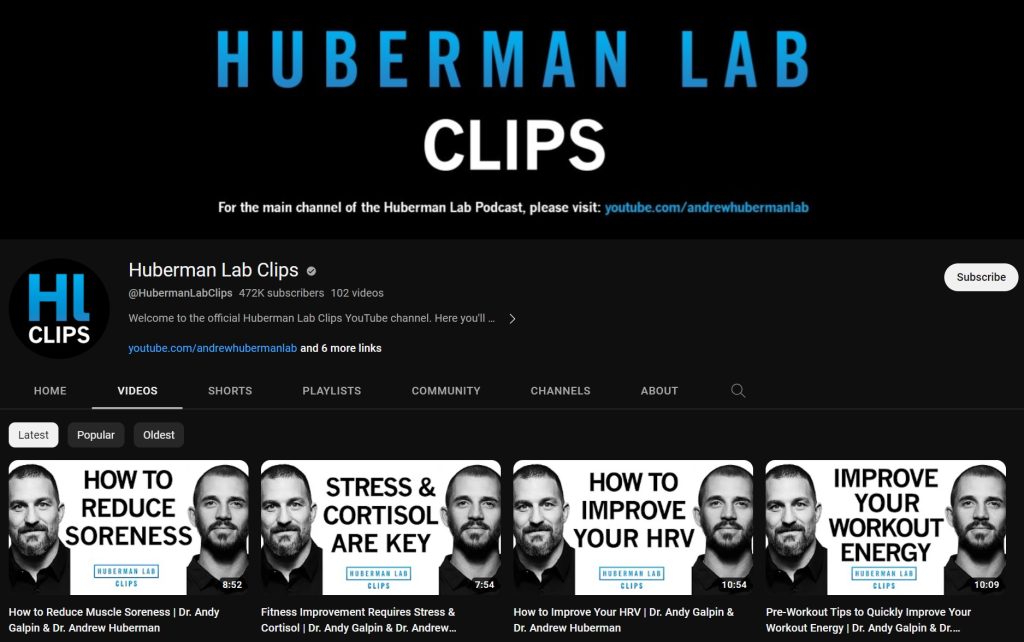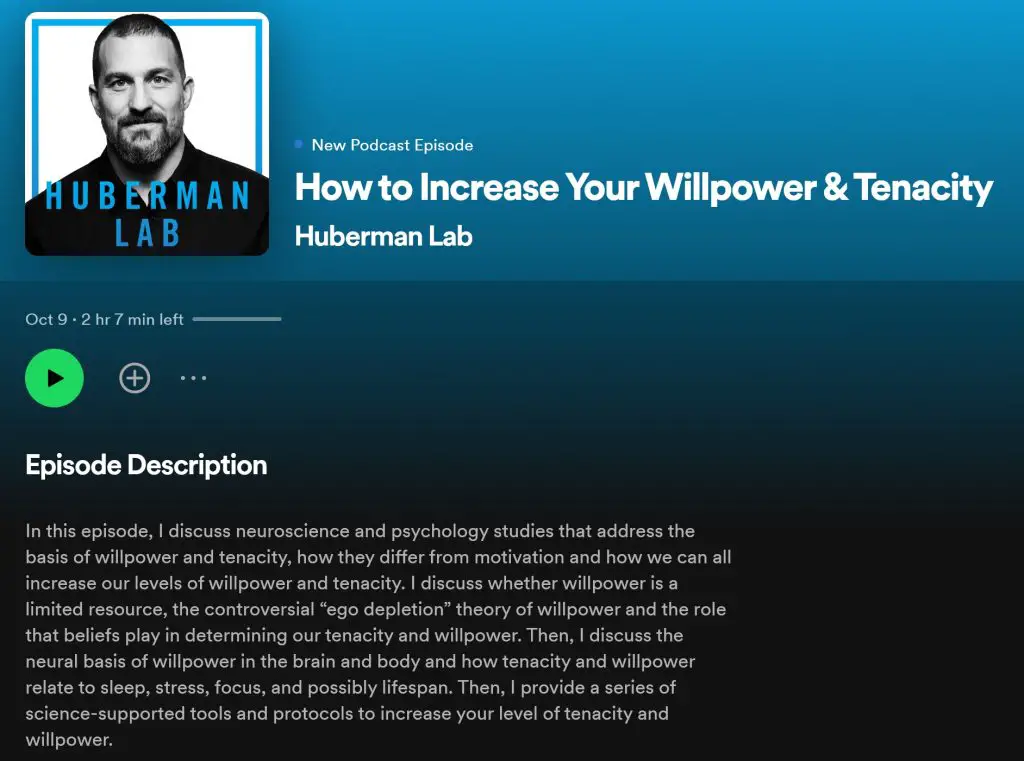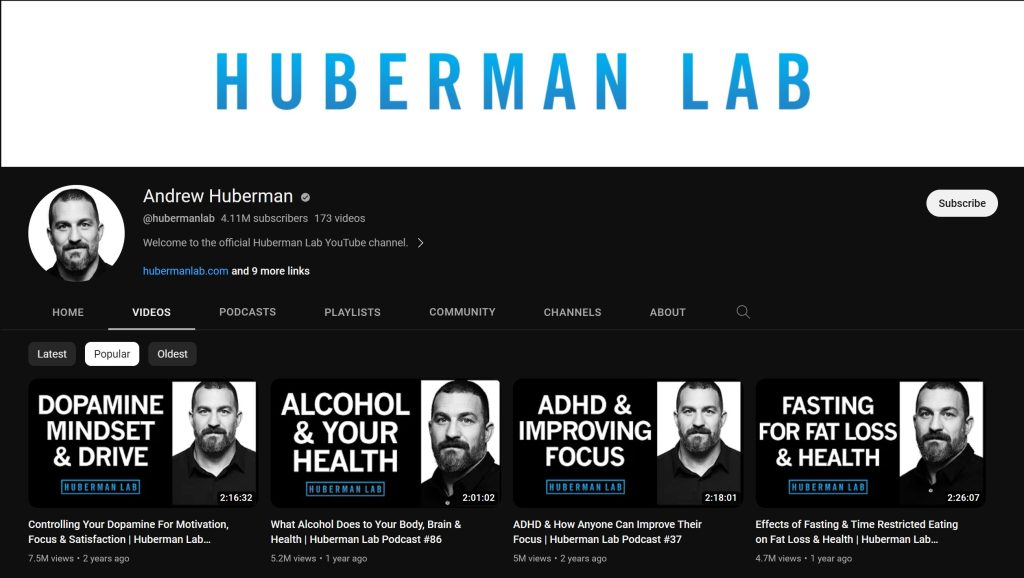Introduction: Huberman Lab
In an era where podcasts have taken the world by storm, it’s not surprising to find an array of shows catering to every interest under the sun. Among the plethora of options, the “Huberman Lab” podcast stands out as a fascinating and intellectually stimulating journey into the realms of neuroscience,1 psychology, and human potential. The Huberman Lab YouTube channel started in 2013. To date, it has had over 180 million views. The most popular video has 7.5 million views and the channel has 4.11 million subscribers. Dr. Andrew Huberman, a prominent neuroscientist and professor at Stanford University, hosts this podcast, offering a unique blend of scientific insight and practical advice that has captivated audiences worldwide. Here’s a brief overview I put together of Dr. Huberman’s background:
Early Life and Education
Dr. Andrew Huberman was born and raised in California, USA. He developed an early interest in science and the brain, which eventually led him to pursue a career in neuroscience. He earned his undergraduate degree in biology from the University of California, San Diego (UCSD).

Doctoral Studies
Dr. Huberman continued his education at UCSD, where he completed his Ph.D. in neurobiology. His doctoral research focused on the development and plasticity of neural circuits in the visual system. This foundational work laid the groundwork for his future research in the field of neuroscience.
Postdoctoral Research
After completing his Ph.D., Dr. Huberman pursued postdoctoral research at Stanford University, where he continued to investigate neural circuit development and function. His work during this period contributed to our understanding of how the brain processes visual information and adapts to changes in the environment.
Academic Career
Dr. Huberman’s career in academia took shape when he joined the faculty at Stanford University as a professor. He became an associate professor in the Department of Neurobiology and a member of Stanford’s Bio-X and Neurosciences Institute.
Research Contributions
Throughout his academic career, Dr. Huberman’s research has focused on various aspects of neuroscience, including neural circuitry, vision, stress, and the impact of hormones on brain function. His work has been published in reputable scientific journals, earning him recognition in the scientific community.
Science Communication
In addition to his research endeavors, Dr. Huberman has a strong passion for science communication. He recognized the need to bridge the gap between scientific research and the general public, leading him to establish the “Huberman Lab” podcast. This platform allows him to share his knowledge, insights, and practical advice on topics related to neuroscience, psychology, and human potential with a global audience.
Educational Outreach
Dr. Huberman’s dedication to education extends beyond his podcast. He has been actively involved in teaching and mentoring students, contributing to the education of the next generation of neuroscientists. His commitment to making science accessible has garnered him a following of enthusiastic learners from diverse backgrounds.
Dr. Andrew Huberman’s background reflects his lifelong passion for neuroscience, his commitment to advancing our understanding of the brain, and his dedication to communicating scientific knowledge to a broader audience. Through his research, teaching, and the “Huberman Lab” podcast, he continues to make significant contributions to both the scientific community and the general public’s understanding of the complexities of the human brain.

Huberman Lab: Unraveling the Mysteries of the Brain
The human brain remains one of the most enigmatic and intricate structures in the universe. The “Huberman Lab” podcast dives headfirst into this intriguing subject matter, unraveling the mysteries of the brain in an accessible and engaging manner. Dr. Huberman’s ability to distill complex neuroscience concepts into understandable bite-sized portions is truly commendable. Whether you’re a seasoned neuroscientist or a curious novice, this podcast provides valuable insights into the inner workings of our most vital organ.
Accessible Science for All
One of the podcast’s standout features is its accessibility. Dr. Huberman’s delivery style is relatable and easy to follow, making complex scientific topics comprehensible to a broad audience. He avoids jargon and provides real-world examples, ensuring that listeners from all walks of life can grasp the fascinating content. This inclusivity is a breath of fresh air in a field that often feels exclusive to experts.
Practical Applications for Everyday Life
While the “Huberman Lab” podcast delves deep into the science of the brain, it doesn’t stop there. Dr. Huberman consistently bridges the gap between theory and practical application, offering valuable advice that listeners can incorporate into their daily lives. From discussions on sleep optimization and stress management to techniques for enhancing focus and productivity, this podcast equips its audience with tools to improve their well-being.
Mind-Body Connection
A recurring theme in the podcast is the profound connection between the mind and body. Dr. Huberman explores how our mental state influences our physical health and vice versa. This holistic approach to human well-being is both enlightening and empowering. Listeners gain a deeper understanding of the interplay between their mental and physical health, paving the way for a more balanced and fulfilling life.
Guest Experts and Varied Topics
Dr. Huberman often invites guest experts to join him on the podcast, adding diversity to the content and providing listeners with a broader perspective on neuroscience-related subjects. These experts, hailing from various fields, bring their unique insights and experiences to the table, enriching the overall listening experience.
Cutting-Edge Research
The “Huberman Lab” podcast keeps listeners on the cutting edge of neuroscience and psychology research. Dr. Huberman shares the latest findings and breakthroughs in the field, ensuring that his audience remains up-to-date with the most current developments. This commitment to staying at the forefront of science makes the podcast a valuable resource for anyone interested in the ever-evolving world of neuroscience.
Exploring the Senses and Perception
A fascinating aspect of the “Huberman Lab” podcast is its exploration of the senses and perception. Dr. Huberman delves into the intricate ways in which our brain processes information from the environment, shaping our perception of the world around us. From discussions on vision and hearing to the fascinating world of sensory perception, these episodes shed light on the wonders of human cognition.
Mindfulness and Mental Health
In today’s fast-paced world, mindfulness and mental health have become critical topics of discussion. Dr. Huberman devotes episodes to these subjects, providing practical techniques to help listeners manage stress, anxiety, and other mental health challenges. The podcast serves as a valuable resource for those seeking strategies to cultivate a more mindful and resilient mindset.

Neuroplasticity and Learning
The concept of neuroplasticity, the brain’s ability to adapt and change throughout life, is a recurring theme in the podcast. Dr. Huberman explores how we can harness neuroplasticity to enhance our learning abilities, optimize our brain’s potential, and even recover from injuries. These episodes offer hope and inspiration, highlighting the brain’s incredible capacity for growth and adaptation.
Transcending Boundaries
The “Huberman Lab” podcast extends beyond the confines of traditional neuroscience, touching on topics such as human potential, performance optimization, and even personal development. Dr. Huberman’s interdisciplinary approach encourages listeners to think beyond the boundaries of their fields and consider the broader implications of neuroscience in various aspects of life.
Building a Community of Curious Minds
Beyond its informative content, the podcast has fostered a vibrant community of curious minds. Dr. Huberman’s engaging delivery and willingness to interact with his audience have created a sense of belonging among listeners. The show’s social media presence and active engagement with its audience enhance the overall experience, making it feel like a shared journey of exploration and discovery.
The Power of Storytelling
Storytelling plays a pivotal role in the “Huberman Lab” podcast. Dr. Huberman uses anecdotes, real-life examples, and case studies to illustrate key points, making the content relatable and memorable. This narrative approach not only educates but also captivates, leaving a lasting impact on the audience.
Practical Takeaways
Each episode of the podcast leaves listeners with practical takeaways that they can apply immediately. Dr. Huberman’s emphasis on actionable advice distinguishes the show from other science-related podcasts. Whether it’s improving sleep quality, managing stress, or enhancing cognitive performance, the podcast equips its audience with tangible strategies for self-improvement.
Scientific Integrity
Throughout the “Huberman Lab” podcast, scientific integrity remains a core principle. Dr. Huberman emphasizes the importance of evidence-based practices and encourages critical thinking. He distinguishes between established scientific findings and emerging research, fostering a culture of intellectual curiosity and skepticism.
Global Appeal
It’s a Stanford professor who hosts the podcast, but its appeal extends far beyond the academic community. Dr. Huberman’s commitment to making neuroscience accessible ensures that listeners from around the world can benefit from the knowledge and insights shared on the show. The universality of the topics discussed transcends geographical boundaries.

Pros of the Huberman Lab Podcast:
- Accessible Science: Dr. Huberman’s ability to make complex neuroscience concepts understandable to a broad audience is a significant advantage. The podcast is inclusive, catering to both experts and novices.
- Practical Application: The podcast doesn’t just delve into theory; it provides practical advice that listeners can apply in their daily lives, from improving sleep to managing stress.
- Interdisciplinary Approach: Dr. Huberman’s willingness to explore topics beyond traditional neuroscience boundaries, such as human potential and personal development, adds depth and diversity to the content.
- Cutting-Edge Research: The podcast keeps listeners updated with the latest developments in neuroscience and psychology, ensuring that it remains relevant and informative.
- Engaging Storytelling: Dr. Huberman’s use of anecdotes and real-life examples makes the content relatable and memorable, enhancing the overall learning experience.
- Community Building: The podcast fosters a sense of belonging among its listeners, creating a vibrant community of curious minds. Dr. Huberman’s engagement with the audience on social media further strengthens this connection.
Cons of the Huberman Lab Podcast:
- Limited Depth: While the podcast provides a solid foundation in various neuroscience topics, it may not satisfy the thirst for in-depth knowledge that some experts in the field seek.
- Varied Quality: As with many podcasts, the quality of individual episodes can vary. Some may be exceptionally informative and engaging, while others may not meet the same standards.
- Repetition: Over time, listeners may encounter repetitive themes or concepts as Dr. Huberman revisits certain topics in different episodes. This can lead to a sense of déjà vu for dedicated followers.
- Lack of Structured Curriculum: The podcast follows a somewhat random pattern, addressing different topics in each episode. This lack of a structured curriculum may make it challenging for listeners to follow a progressive learning path.
- No Peer Review: Unlike academic publications, the podcast lacks peer review, which means that the accuracy and credibility of the information shared solely rely on Dr. Huberman’s expertise and diligence.
- Limited Focus: While the podcast explores a wide range of topics, it may not delve deeply into some specific areas of neuroscience or psychology that listeners might be particularly interested in.
The “Huberman Lab” podcast offers a plethora of advantages, including accessibility, practicality, and engagement. However, it also has its drawbacks, such as potential limitations in depth and variability in episode quality. The podcast’s overall value depends on the individual listener’s goals and expectations, making it a worthwhile resource for those seeking a comprehensive introduction to the world of neuroscience and psychology with practical applications for everyday life.

FAQs on the Huberman Lab Podcast
1. What is the Huberman Lab Podcast?
The podcast explores topics related to neuroscience, psychology, and human potential, making complex scientific concepts accessible to a broad audience. Dr. Andrew Huberman, a neuroscientist and professor at Stanford University, hosts the Huberman Lab Podcast.
2. Who is Dr. Andrew Huberman?
Dr. Andrew Huberman is a prominent neuroscientist known for his research in neural circuit development and function. He is also an educator and the host of the Huberman Lab Podcast. He earned his Ph.D. in neurobiology from the University of California, San Diego (UCSD).
3. What topics are covered in the podcast?
The podcast covers a wide range of topics, including neuroscience, psychology, stress management, sleep optimization, neuroplasticity, sensory perception, and many others. Dr. Huberman often invites guest experts to provide diverse perspectives on these subjects.
4. Is the podcast suitable for both experts and beginners in neuroscience?
Yes, the podcast is designed to be accessible to individuals with varying levels of knowledge in neuroscience. Dr. Huberman’s approachable style and emphasis on practical applications make it suitable for both experts and beginners.
5. Are there any practical takeaways from the podcast?
Absolutely. Dr. Huberman frequently provides practical advice and techniques that listeners can apply to their everyday lives. Topics such as stress management, sleep improvement, and cognitive enhancement offer actionable strategies for personal growth.
6. How often are new episodes released?
The release schedule for new episodes can vary, but Dr. Huberman typically publishes episodes regularly. Listeners can subscribe to the podcast to receive notifications of new releases.
7. Can I interact with Dr. Huberman or ask questions?
Dr. Huberman is actively engaged with his audience on social media platforms and often responds to questions and comments. You can also connect with him through various channels mentioned on the podcast’s website.
8. Is the podcast based on scientific research and evidence?
Yes, the podcast is firmly grounded in scientific research and evidence. Dr. Huberman emphasizes the importance of evidence-based practices and draws on his extensive background in neuroscience to provide reliable information.
9. Can I suggest topics or guests for the podcast?
Dr. Huberman welcomes suggestions and feedback from his audience. Listener questions and requests inspire many episodes, so you can contribute to the podcast’s content.
10. Where can I listen to the Huberman Lab Podcast?
The podcast is available on popular podcast platforms like Apple Podcasts, Spotify, Google Podcasts, and others. You can also find it on the official Huberman Lab website.
11. Is there a community or forum for podcast listeners to connect? While there isn’t an official forum, the podcast has a strong online presence and active social media engagement. You can connect with fellow listeners and engage in discussions on platforms like Instagram, Twitter, and Facebook.
12. Are there any recommended episodes for beginners?
Dr. Huberman occasionally highlights introductory episodes that are particularly suitable for newcomers to the podcast. You can also explore the podcast archives and choose topics that pique your interest.
13. Is Dr. Huberman involved in any other educational initiatives?
In addition to the podcast, Dr. Huberman is actively involved in teaching and mentoring students at Stanford University. He also participates in public speaking events and shares educational content on various platforms.

Conclusion: Huberman Lab
In conclusion, the “Huberman Lab” podcast is a remarkable journey into the fascinating world of neuroscience, psychology, and human potential. Dr. Andrew Huberman’s accessible and engaging style, commitment to practical application, and dedication to scientific integrity make this podcast a valuable resource for anyone interested in understanding the complexities of the human brain and improving their well-being.
The show’s ability to build a community of curious minds, foster interdisciplinary thinking, and provide actionable takeaways sets it apart in the world of science communication. As we continue to explore the depths of the mind and uncover its mysteries, the “Huberman Lab” podcast serves as a beacon of knowledge and inspiration for all.
If you enjoyed this article, next time read my most recent Expert Health Material website review: An Expert Look At The “Everyday Health” Website: Great Or Good?

Systems Engineer > Project Manager > Tech Entrepreneur > Health Consultant > Website Specialist
- Neuroscience, also known as Neural Science, is the study of how the nervous system develops, its structure, and what it does. Neuroscientists focus on the brain and its impact on behavior and cognitive functions. Not only is neuroscience concerned with the normal functioning of the nervous system, but also what happens to the nervous system when people have neurological, psychiatric and neurodevelopmental disorders.
